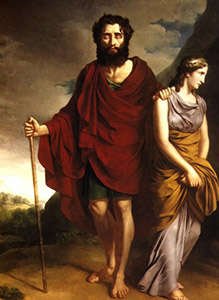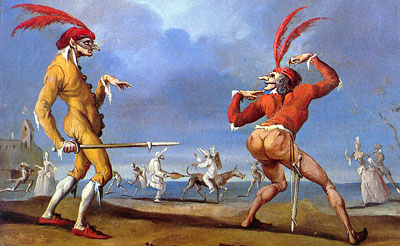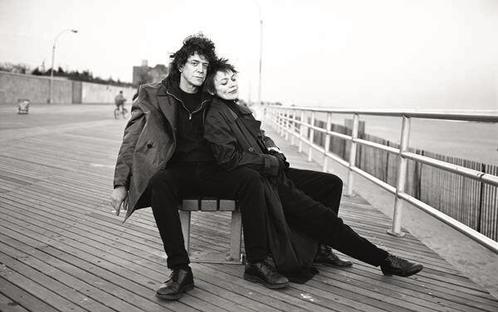|
Recently I liked this far away three-pointer by Laurie Anderson and Lou Reed. They always struck me as adventurous storytelling characters, Super-people from the quiet wild side. Their quote was about finding ways to get through life. One: "Don’t be afraid of anyone. Now, can you imagine living your life afraid of no one?" Two: "Get a really good bullshit detector." Three: "Three is be really, really tender." “And with those three things” – Laurie said – “you don’t need anything else.” In the full wide range that stretches from street hobos to rich presidents and from Ivy-league dropouts to post-celebrity rehabs, there is a common thread: life is ripe with conflict. Sure, conflict is what made humans sharper, problem solvers until the last beat. Storytellers know that ultimately conflict alone can float identity through a sea of half-truths, up, up to the surface where the sun plays catch with flying fish. However important our culture of conflict may be, the search for less human pain, suffering, and crisis may also be a story to pursue. A peaceful target to shoot for. In dramatic movies, the ending may be, in terms of plot, happy or unhappy. In either case, if the story works, the viewer is rewarded with insights into the depths of human life. The ancient Greeks attended Tragedies more than school, feasting on pop-corn-less morality with cathartic heroes like Oedipus (an unknowing motherfucker) or universal strategists like Ulysses, king of the surprise climax. Endings in these stories didn’t seem to matter much. The deus ex machina finale at times gave Gods the task of resolving plot indecision or confusion. This over-the-top device released authors from spending too much stage-time on predictable closing show and tell details. (They lived happily ever after! was another shortcut). The middle of the story is where it all happened. Development, substance, focus, now. So, what can we learn about “making our life better” by watching a film story? It is true that caped Super-heroes are our cultural diet now, just as Commedia dell’Arte theatre masks were dominant wanderers from town to town for four centuries. Masks are types. Types embody in broad strokes the infinite relationships among standard folk: the rich man, the poor woman, the young lovers, the old doctor, the cop, the thief, the servant. It’s all about relationships, stupid. A film I would watch again is one that leads to my relationship with the story. Titanic was a lesson in teen-age blockbuster making, who would have thought it? Multiple viewings create a relationship, characters become familiar: it’s the key to the new TV series mania. Note for debate: Characters are not people, but they’re close enough to pretend. Characters stand in a story because the plot says so, and the writer cast them for a role. No script? No character. They look like people, however. Or should. This is not the case in real life where life may be scripted but in all likelihood is not very good. Determinists saw destiny play a bigger part than individuals. In the west we famously trust individual agency and will to drive success and failure. You want to be the big boss man? Slay the dragons. Dominate your universe and plunge forward. Action films seem equivalent to playing Mozart with only Major chords. (Male chords, duh) I have a preference for the Minor Key in film. Movies that don’t try and impress only with underlined cinematic cartwheeling. I have the same bias meeting people at parties. If a film reveals a personal insight, I am Up. If there is a label that explains everything or indicates next to each action, I am turned off. I follow film-makers that make movies that matter, even a little. As a producer of youth-cinema, I see film conflict not as a medieval head-to-head battle to release adrenaline, but a personal texture, an inside chess game of question marks: where to go? what to do? How? Who with? Well told conflict can be hesitation pure and simple. Or an identity short-circuit. Or lack of clarity, loss of vision. How to take direct action choices, then? Voting can be Hamletic too, in hard times. Even without a simple top-down final duel on a skyscraper, a film can lead to a character’s foggy melting point, the quiet intersection of dramatic need, desire and urgency in search of identity. Laurie Anderson and Lou Reed are not film characters. Their lingo is story with sound. They quest to stay away from trouble, they are grounded in their shape-shifting personae. Who they want to be? Simple: happier spending time together. Popcorn flicks too could explore that engagement vibe. In the script of life rewritten, I would try reducing, not adding, conflict to stories. Better conflict, of course, the one worth fighting for without fists and watching with senses aloft. As James Joyce said, the cinema is a “screen of consciousness”. Luckily I am not afraid of fear, I can smell bullshit from outside the playground, and I still want to hear my kids tell me I was kind. That’s a step towards a better now, even for a callous storyteller like me. There is already enough conflict to go around in the world. Danny Alegi is a filmmaker, story development coach and speaker. Read more of Danny's blogs at 'Movies Without Cameras'.
1 Comment
19/8/2023 02:42:36 pm
I wanted to express my gratitude for your insightful and engaging article. Your writing is clear and easy to follow, and I appreciated the way you presented your ideas in a thoughtful and organized manner. Your analysis was both thought-provoking and well-researched, and I enjoyed the real-life examples you used to illustrate your points. Your article has provided me with a fresh perspective on the subject matter and has inspired me to think more deeply about this topic.
Reply
Leave a Reply. |
Guest BlogWhere craftsmen and women share their thoughts on storytelling. Archives
January 2018
Categories |



 RSS Feed
RSS Feed